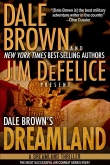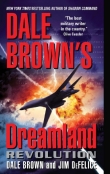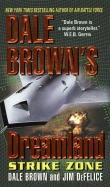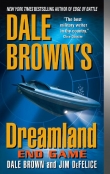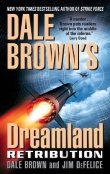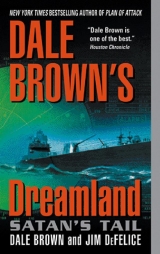
Текст книги "Satan's Tail"
Автор книги: Dale Brown
Жанр:
Боевики
сообщить о нарушении
Текущая страница: 2 (всего у книги 22 страниц)
The ship took a hard turn to port, still working to duck the rapidly approaching torpedoes.
“Steady, now, Jones,” Marcum told the man at the helm as the ship leaned hard toward the water. The helmsman had put a little too much into the maneuver; the Abner Read’s bow tucked well below the waves as she spun. The ship for-gave him, picking her bow up and stabilizing in the proper direction.
“Torpedo one has passed. Torpedo two has self-destructed,” said the computer.
“They’re running for it,” said Eyes.
“They can’t run fast enough,” answered Storm. “Full active radar. Target the missile ship. I want him for dinner.”
Dreamland
3 November 1997
0901
DOG LOOKED UP AT THE FAMILIAR KNOCK. CHIEF MASTER
Sergeant Terrence “Ax” Gibbs appeared in the doorway, head cocked in a way that indicated the chief wanted to talk to the colonel in confidence for a few moments. Bastian might be the commander of Dreamland—the Air Force’s secret high-tech development facility in the Nevada desert—but Ax Gibbs was the oil that made the vast and complicated engine run smoothly.
“Chief?”
“Couple of things, couple of things,” said Ax, sliding into the office.
Dog knew from the tone in the chief’s voice that he was going to once again bring up their chronic personnel short-ages. He reached to his coffee cup for reinforcement.
“Need a refresher?” asked Ax.
“No thanks.”
“I’ve been looking at head counts …” Ax began, intro-
SATAN’S TAIL
23
ducing a brief lecture that compared Dreamland’s overall workforce to a number of other Air Force commands and facilities, as well as DARPA—the Department of Defense Advanced Research Program Agency—and a number of private industry think tanks. The study was impressive for both its breadth and depth. Ax’s numbers not only compared overall positions, but broke them down to real-life instances, such as the number of people sweeping the floors. (Dreamland had exactly two people doing this, both airmen with a long list of other duties. The men had been drafted—to put it euphemistically—into the service when budget cuts eliminated the contract civilian cleaners.)
“… and we’re not even considering the fact that a good portion of the head count here is also involved in Whiplash,”
added Ax. He was referring to Dreamland’s “action” component, which included a ground special operations team, headed by Danny Freah, as well as whatever aircraft were needed for the mission.
“Preaching to the converted,” said Dog.
“Yes, but I do have an idea,” said Ax. “Congresswoman Kelly.”
“Congresswoman Kelly?”
“Congresswoman due in next week on the VIP tour,” said Ax. “She has a staffer who has a brother in the Air Force. If a nonclassified version of the report were to find its way into the staffer’s hands …”
“No thank you,” said Dog curtly. He reached for some of the papers Ax had brought in.
“Colonel—”
“I don’t want to play Washington games.”
“With respect, sir.”
Dog put down the papers and looked up at the chief. Ax’s lips were pressed together so firmly that his jowls bulged.
“Ax, you know you can speak freely to me any time,” said Dog. “Hell, I expect it. None of this ‘with respect’ shit. You want to call me a jackass, go for it. You’ve earned it.”
“Colonel … Dog.” The chief pulled over the nearby chair 24
DALE BROWN’S DREAMLAND
and sat down, leaning forward with his elbows on the desk.
“Your people are really busting. Really, really busting.”
“I know that.”
“We have to get more people here. And that’s true everywhere. Dr. Rubeo was saying—”
“Ray could find a cloud over the desert, and does so regularly.”
“Even the scientists are overworked. Jennifer has what, five different projects going? She’s been the main test pilot on the Werewolves after Sandy Culver and Zen. Did you know that?”
“Did I?” Dog laughed. “She brags about it all the time.”
“Well, now I like her a lot, but she has other things she’s gotta do. And the rest of the people here, hell, they’re as bad or worse. Civilian scientists, military officers, and enlisted—they’re all overworked workaholics. Problem is, Colonel, sooner or later the people who can leave will leave.
Sooner or later, when you haven’t had a chance to sleep in a week, it catches up to you.”
“Who hasn’t slept in a week?”
Ax rose from the chair.
“I’ll do what I can, Ax,” said Dog. “But I’m not sneaking through the back corridors of Congress to get what we need.”
“Yes, sir. Major Smith is outside, reporting for duty.”
Ax opened the door before Dog could say anything else.
Mack Smith was sitting in the outer office, flirting with the secretary.
“Mack,” said Dog, getting up. “I thought you were in rehab.”
“I am,” said Smith. He turned awkwardly in his wheelchair and rolled toward the doorway. Even though the door had been widened after Zen returned to active duty, it was a tight squeeze. It took Mack a few seconds to maneuver through the doorway.
“Major Mack Smith, formerly of the Brunei Royal Air Force, reporting for active duty,” said Smith.
SATAN’S TAIL
25
“I thought we agreed you would use the facilities here but wait to get back to work until the doctors gave you a clean bill of health.”
“Ah, the doctors say I’m fine.”
“The doctors said there’s no reason you won’t get your legs back. That’s not quite fine.”
“What do the doctors know? Besides, Zen didn’t wait.”
“Zen’s circumstances were different,” said Dog.
“Sure. He had a high-powered lawyer read the Air Force and the DoD the riot act,” said Mack. “And he was related to the base commander.”
Dog bristled. Zen was his son-in-law, but he had had nothing to do with his reinstatement.
“Zen was posted here before I arrived,” said Dog.
“Look, Colonel, the thing is—I’m bored out of my skull, right? I’m going through rehab. I have to come onto the base every day. Might as well put me to work, right?”
“It’s not that I don’t want to put you to work, Mack.”
“I can get a high-priced lawyer if I have to,” said Mack. “I hear Zen’s is available. Us gimps have to hang together.”
Dog felt his face flush at the word “gimps.”
“You’re worried that I won’t do the crap work, right?”
added Mack. “You’re looking at a new man, Colonel. Brunei taught me a lot.”
“One of the things it taught you is that you don’t like administrative crap work,” said Dog. “You told me that yourself. Several times.”
“I don’t like it, but I’ll do it. Same as you. We’re not that different, you and me, Colonel. We like to have our sleeves rolled up,” he added.
God help me, thought Dog, if I have anything in common with Mack Smith. “All right,” he said. “There are a lot of things that need to be done. None of them involve flying.”
“Who’s flying? Bring them on.”
“The Piranha program needs a liaison. Someone who can work with the Navy people to help them move it to the next phase.”
26
DALE BROWN’S DREAMLAND
“Right up my alley,” said Mack. “A big part of my job in Brunei was interfacing with Navy people.”
He was referring to his position as head of the Brunei air force, which had in fact required him to work with members of the country’s other military services. From all reports—including Mack’s—it had not gone well.
Piranha was one of several Navy projects being developed under contract at Dreamland. An underwater robot probe, it could be controlled by ship, submarine, or aircraft and operate for several weeks without needing to be refueled. The technology that guided it was similar to the technology used in the Flighthawks, which was one of several reasons it was being developed here. Dreamland had used Piranha to halt a nuclear war between India and China.
“What else do you want me to do?” asked Mack.
“Let’s start there. Remember, you’re a liaison, not the program director.”
“I’m the idea guy,” said Mack. “Got it.”
“Not exactly.”
“Don’t worry, Colonel. I have it. Listen, I really appreciate this. I won’t forget it, believe me. I’m happy to be back.
Like I said, Brunei taught me a lot. This is a new Mack Smith you’re looking at.”
As the major rolled out of the office, Dog struggled to keep his opinion of how long the new Mack Smith would last to himself.
Aboard the Abner Read
3 November 1997
1942
“WE HAVE A LOCK ON THE OSA MISSILE BOAT,” REPORTED
Weapons.
“Marcum, he’s yours to sink,” said Storm.
“One of the patrol boats is turning toward us,” warned Eyes.
“Torpedo in the water,” warned the computer.
SATAN’S TAIL
27
“Fire,” said Commander Marcum.
A deep-throated rap from the front of the ship drowned out the acknowledgment as the number one gun began spitting out shells, one every five seconds. The holographic display did not delineate every hit—the designers thought this would be too distracting—but the target flashed red as the barrage continued.
“Direct hit,” reported Eyes. “Target demolished.”
“Evasive action,” said Marcum. “Evade the torpedoes.”
The crew sprang to comply. One of the torpedoes stayed on target with the Abner Read despite the countermeasures, and the lithe vessel swayed as the helmsman initiated a fresh set of maneuvers. The torpedo finally passed a hundred yards off their port side, detonating a few seconds later.
“Close the distance on the patrol boat that fired at us,”
Marcum told the man at the wheel.
The helmsman pushed at the large lever that worked the computer governing the ship’s engines. They were already at full speed.
“UI-1 is about a minute from Yemen waters,” reported Eyes.
“Outside of visual range. The others are well beyond him.”
“I have a lock on target designated as UI-1,” said the weapons officer.
“Captain, it’s my responsibility to report that the target ship is approaching Yemen territorial waters,” said Commander Marcum. “Our rules of engagement prohibit sinking a vessel outside of neutral waters.”
“Are you giving me advice?” Storm asked.
“Sir, I’m operating under your orders. I was to notify you of our status prior to engagement …” Commander Marcum paused. “I want to sink the son of a bitch myself.”
“Noted. Sink him.”
“Weapons: fire!”
“Firing.”
Both guns rumbled. Within thirty seconds the patrol craft had been obliterated.
The three other pirate vessels had disappeared. Relatively 28
DALE BROWN’S DREAMLAND
small contacts, they were easily lost in the clutter near the ir-regular coast. The computer generated approximate positions from their last known citing, rendering them yellow clouds in the holographic projection. They were well inside Yemen territorial waters—out of bounds.
Storm turned his attention to the three Shark Boats. He directed One and Two to sail westward, hoping to catch the patrol boats if they went in that direction. The third would remain to the east, in case they went that way. The Abner Read, meanwhile, would search for survivors from one of the two vessels they had just sunk; if recovered, he might be persuaded to share what he knew.
Storm clicked his communications channel into a public address mode that allowed him to communicate not just with all personnel aboard the Abner Read, but with everyone in the combat group.
“All hands, this is Captain Gale,” said Storm. “The DD
(L) 01 Abner Read has sunk its first enemy combatants in action this November 3, 1997. I was privileged to witness the finest crew in the U.S. Navy undertake this historic mission, and I commend everyone, from Commander Robert Marcum to Seaman Bob Anthony—Bobby, I think you’re our youngest crewman,” he added. Storm turned and saw Marcum grinning and nodding. “It was a hell of a job all around. Xray Pop has been christened, ladies and gentlemen. Now look sharp; there’s still a great deal to be done tonight.”
Humboldt County,
northwestern California
3 November 1997
1205
LIEUTENANT KIRK “STARSHIP” ANDREWS GOT OUT OF THE CAR
he had rented in Los Angeles and walked across the gravel parking lot toward the church. He could hear the strains of SATAN’S TAIL
29
an organ as he approached; he was late for his friend’s memorial service.
He was thankful, actually. He felt he owed it to Kick to be here, but didn’t particularly want to talk to anyone, Kick’s parents especially. He just didn’t know what to say.
The music stopped just as Starship came in through the back door. He moved quickly toward the last pew in the small church, eyes cast toward the floor. The minister began reading from the Second Book of Chronicles, a selection from the Old Testament of the Bible concerning the bond between Solomon and God: “ ‘Give me now wisdom and knowledge, that I may go out and come in before this people.’ ”
The passage spoke of wisdom and riches; the minister used it as a starting point as he asked God for the wisdom needed to accept a young man’s death. The reverend spoke frankly of the difficulty of comprehending the loss. “Lieutenant James Colby was a hero,” he said. “But that does not make his loss any easier for us to take.”
Was Kick a hero? wondered Starship. He was a decent pilot and a hard worker; he’d been brave and seen combat. But was he a hero?
Kick had died in the line of duty, caught in a Megafortress when it crashed during an aborted takeoff in Malaysia after guerrillas had seized the kingdom of Brunei. Starship had been on the aircraft himself, strapped in next to Kick on the control deck for the Flighthawks. The fact that he was here and Kick wasn’t, he thought, was just a matter of dumb, stupid luck. Bad luck.
If he had died, would he be a hero?
Starship listened as the service continued with different friends recounting their memories of Kick. He’d gotten his nickname not from the high school football team—which was the story Kick had told—but from peewee soccer. It came during his first game as a six-year-old, when he scored a goal. The nickname had stuck from there, becoming wide-spread in high school, where he’d switched to football and set a county scoring record booting extra points and field goals.
30
DALE BROWN’S DREAMLAND
Starship’s mind drifted as the service continued. If the luck had run differently—if he had been the one who got the freak piece of shrapnel, and the sudden shock that combined to do Kick in—what would people be saying about him?
Smart kid– number three in his high school class and in the top five percent at the Academy.
Should have chosen a few more gut classes and got top honors.
Won an assignment to Dreamland on the cutting edge of aviation.
A mistake. He was flying robot aircraft, glorified UAVs.
The computer did most of the work. It was like sitting at a desk all day.
“I’ll bet you’re Starship.”
Starship turned and saw that a woman had come into his pew from the side. Maybe five-two, with dark hair and green eyes, she looked a lot like Kick.
“Alice,” she whispered. “Kick’s sister.”
“Hi.” He stuck his hand out.
“We’re glad you could come.”
“Yeah, um, I’m sorry.”
“I know.” Distress flickered across her face, but then cleared. “We’re having—my parents are inviting people over later. You should stop by.”
“I kinda gotta get back,” Starship lied.
“Well, OK. But say hello to them on the way out.” She smiled—this time with visible effort—and then slipped out of the pew. Starship watched as she slid into another pew farther up. Somehow this made him feel better, as if he hadn’t been singled out, and when Kick’s parents asked him at the end of the service if he would stop by “just for coffee,”
he agreed and got directions.
SATAN’S TAIL
31
Dreamland
1231
MACK FELT THE MUSCLES IN HIS SHOULDERS TENSE INTO HARD
rocks as he lowered himself into the pool. He had to relax if he was going to do the exercise, but relaxing on command was just about the most difficult thing in the world to do. He lowered his gaze to the surface of the pool and concentrated on breathing slowly, very slowly, as slowly as he possibly could, taking long, deep breaths, as one of the physical therapists at the hospital had recommended.
“All right now, Major, you want to start with a nice, easy breaststroke,” said Penny Hartung, treading water next to him.
“Yeah, that’s what I’m going to do,” he said. But he didn’t let go of the rail, afraid that he would sink into the water like a stone.
Which was impossible, since he was wearing a life preserver. But fear wasn’t necessarily rational.
“You all right?” asked Frank DeLia, the other therapist.
Frank was kneeling above him at the poolside.
“Oh yeah, I’m good,” said Mack, finally pushing away.
He fought against the impulse to paddle madly, moving his arms out slowly as he’d been told.
“Legs now. Legs,” said Penny, hovering beside him.
Yup, legs, Mack thought. Legs, legs, legs.
The large beam that had fallen across his back and legs after the terrorist blew himself up had temporarily shocked his backbone. The medical explanation was somewhat longer and more complicated, but the bottom line was that he had temporarily lost the use of his legs. The thing was, no one could say how long “temporarily” was supposed to be. He’d already seen several specialists; he got the impression they all thought he should be walking by now.
Not that he didn’t agree.
Mack pushed his arms out and willed his legs to kick. He didn’t feel them move. He thought his hips wiggled a little.
32
DALE BROWN’S DREAMLAND
“Legs,” repeated Penny. “Legs.”
He got a mouthful of water as he started to lose momentum. He had his whole upper body working, and thought his legs must be working as well.
“Push, push,” said Penny.
“Doing it.” Mack checked his position against the far side of the pool. He’d gone maybe five feet. “Legs,” he said himself, deciding he might do better if he gave himself a pep talk. “Legs. Let’s do it.”
There was a tremendous splash on the other side of the pool: Zen, who worked out here regularly.
“Come on, gimp boy. That the best you can do?”
Mack ignored Zen, keeping his head toward the other side of the pool room. He sensed Zen swimming toward him. Determined to ignore him, he concentrated on doing a sidestroke, or at least as much of a sidestroke as he could manage.
“Your arms are punier than Olive Oyl’s,” said Zen.
Legs, Mack thought. Legs.
“Use your damn legs,” said Zen.
“I’m trying,” said Mack between his teeth.
“Not hard enough.”
“Yeah. I am.” The burn in Mack’s arms was too much; he stopped and took a breather.
“Don’t be such a damn wimp,” said Zen. He plunged beneath the water, stroking away.
It occurred to Mack that swimming underwater when you couldn’t use your legs to help must be– was—extremely difficult. But then, just about everything you did when you couldn’t use your legs was extremely difficult. And Zen didn’t complain or ask for help—hell, he got mad when people tried to help him.
Which Mack understood. He’d thought after Zen’s crash that Zen got mad only with him, because he held a grudge.
Now he realized Zen got mad with everyone. The reason was simple. Most of the people who wanted to help you—not necessarily all, but most—were thinking, You poor little baby, you. Let me help you.
SATAN’S TAIL
33
For someone like Zen or Mack, being treated like a baby, being pitied– well the hell with that!
But you needed help sometimes. That was the worst part of it. Sometimes you just couldn’t drag yourself up a full flight of stairs, not and bring your wheelchair with you.
“Ready to start again, Major?” asked Penny.
“Oh yeah. Starting,” said Mack, pushing.
“Ten laps, gimp boy!” yelled Zen from the other side of the pool. “You owe me ten laps.”
“Right,” muttered Mack.
“I’m going to do twenty in the time it takes you to do one.”
“It’s not a race,” said Penny.
The others liked Zen, so they wouldn’t tell him to shut up, Mack thought. And he wasn’t going to tell him to shut up either, because that would be like saying Zen had won. No way. Let him be the world’s biggest jerk. Great. Fine. Just because you couldn’t walk didn’t make you a stinking hero or a great human being. Zen was a jerk before his accident, and he was a jerk now.
A bigger jerk.
“Legs,” said Penny.
“Yeah, legs,” grunted Mack.
Humboldt County,
northwestern California
1235
KICK’S FAMILY LIVED ON A CUL-DE-SAC NOT FAR FROM THE
town center in McKinleyville, California, the sort of location a real estate agent would call “convenient to everything.” Starship parked at the far end of the circle. As he walked up the cement driveway, he started to regret his decision to come. He paused at the bottom of the steps, but it was too late; someone came up the drive behind him, and as he glanced back, the front door opened.
“You’re his friend. How do you?” said Kick’s father at the 34
DALE BROWN’S DREAMLAND
door. “Have a drink, please. Make yourself at home.”
“Maybe just a beer, I think,” said Starship, stepping inside.
“Bud’s in the fridge. Help yourself.”
Starship moved inside. As he reached the kitchen he saw Kick’s sister bending into the refrigerator—and noticed that she had a large engagement ring on her finger.
“Oh, Lieutenant Andrews,” she said. “I’m glad you changed your mind.”
“I can only stay for a few minutes.”
“Want something to drink?”
“A beer maybe.”
“Just like my brother.” She reached in and got him a Bud Lite, then introduced him to some of the other people in the small kitchen. Two were friends of Kick’s and about his age; Starship thought the men shrank back a bit as he shook their hands, maybe put off by his uniform. There was an aunt, the sister’s fiancé, a cousin, and the minister, who proved to be much younger up close than from the back of the church.
Starship took his beer and moved toward the side of the kitchen. The others were talking about something that had happened at the local school.
“It was an unfortunate situation,” said the minister as Starship slid to the side.
“Yeah, really bad,” said Starship.
“He died a hero.”
“Do you think that matters?”
The minister blanched. Starship hadn’t meant it as a challenge—hadn’t meant anything, really. The question simply bubbled out of his private thoughts.
“Don’t you?” said one of Kick’s friends.
Starship felt a moment of hesitation, a catch in his throat as if his breath had been knocked from him.
“I don’t think he’s not—wasn’t brave, I mean. I think it sucks that he died,” he said. “I think it’s really terrible. And he was—he volunteered. We all did, and it’s important what we do.” He knew he was babbling but he couldn’t stop. “He was a brave guy, I mean, as brave as most people, I think, but SATAN’S TAIL
35
it wasn’t like—it’s not like a movie thing, you know, where the guy charges out and people are shooting at him. We do have guys like that. They just march right through anything.
And to be a pilot, I mean, you do face death, you know. But, you don’t think about it like—it’s not a movie thing. It didn’t happen like you’d think it would happen in a movie. We were there and then he was dead.”
Finally he stopped talking. He felt thankful, as if someone else had been making his mouth work and he had no control.
“The Lord does have a plan for us all,” said the minister.
Starship wanted to ask him how he knew, and more important, how someone could find out what the plan was. But he was afraid of opening his mouth again. He didn’t want the others to misunderstand him, and he didn’t want to insult the minister. Starship knew he wasn’t the most religious person in the world; he believed in God, certainly, but if he found himself in church more than twice a year, it was a lot.
No one else in the kitchen spoke. Starship thought everyone was staring at him.
“That was a nice passage from the Bible,” the cousin told the minister.
“There’s a lot of solace in the Old Testament,” said the minister.
Starship realized that the reverend was struggling to find the right words to say. Which surprised him. Weren’t ministers supposed to have this stuff down cold?
“Did you know Kick well, Lieutenant?” asked the cousin.
“Uh, we were in the same unit. We were together—” Starship stopped short of telling them how Kick had died. Partly it was for official reasons: Details of the mission remained classified. But mostly he didn’t want to talk about it—didn’t want to describe how he’d pulled his friend from the wreck, only to discover he was dead.
Everyone stared.
“He was a heck of a pilot,” said Starship finally. He could talk about this—this was easy, nothing but facts and no interpretation; easy, straightforward facts. “I’ll tell you, I saw 36
DALE BROWN’S DREAMLAND
him fly an A-10A once. We, uh, we had one at the base.” He checked himself again, knowing he couldn’t mention Dreamland, much less what aircraft were there. “Had that A-10A turning on a dime. Ugly plane.”
One of the friends mumbled something in agreement, then ventured that Kick had always liked to fix cars when he was in high school. Starship downed the rest of the beer, then slipped out as quickly as he could.
Aboard the Abner Read,
off the Horn of Africa
3 November 1997
2042
STORM ADJUSTED THE LOOP AT HIS BELT, EASING THE BRAKE
on the safety rope system so he could move more freely on the deck of the ship. Angled and faceted to lessen its radar profile, the ship’s topside was not particularly easy to walk on, even in relatively calm seas, and with no railing along the sides of the ship, the safety rope was an absolute necessity. He walked forward along the starboard side, steadying himself on the gun housing.
The Abner Read had sent its two rigid-hulled inflatable boats from the stern to search through the floating debris to the northwest. The two men on deck had seen something near the ship and, with bad weather approaching and the boats a good distance away, had worked together to pick it up before it was lost. One of the men had actually gone over the side, using his safety gear to climb down the knifelike bow area, perching on the side and fishing for the debris with a long pole.
Another commander would have probably considered this a foolhardy move, and very possibly had their captain discipline the men—if he didn’t do so himself. But Storm wasn’t another commander. While the man who had gotten down on the side of the ship had been dashed against the hull rather severely by the waves, in Storm’s opinion he had SATAN’S TAIL
37
shown precisely the sort of can-do attitude the Navy ought to encourage.
“A jacket, sir,” said one of the sailors, handing him the dark blue cloth that had been retrieved.
More precisely, it was half a jacket. There was something in one of the pockets—a folded rial.
Yemeni currency. Hard proof that the Yemenis were involved, just in case anyone doubted him.
“Damn good work,” said Storm. He put the jacket under his arm. “Damn good work.”
“Thank you, sir,” shouted the men.
“Carry on,” said Storm. He paused. “And don’t drown.”
The sailors laughed. “Yes, sir.”
Storm turned to go back. This was the Navy at its best—filled with sailors who weren’t afraid to show initiative, and whose voices carried the proper tone of respect even in ca-sual conversation. He’d selected the best men and women for Xray Pop, knowing the plank owners of the littoral warfare ships would be the seed of the new Navy. They were what the entire Navy ought to be, and it damn well would be when he ran the fleet.
“Captain, you have an eyes-only message waiting, sir,”
said the seaman who met him at the hatchway. Storm followed the man to the communications department, where the crew snapped to as he came in.
“Gentlemen. Where’s my message?”
“Right here, sir,” said the ensign in charge. He stepped back to let Storm sit at the computer terminal. The message had been transmitted through a secure text system. The ensign made a point of going to the radioman at the other station as Storm typed in his password and brought the message onto the screen.
REQUEST FOR RULES CHANGE DENIED. YOU ARE TO PROCEED AS
DIRECTED.
I EXPECT A FULL BRIEFING SOONEST.
ADMIRAL WOODS
38
DALE BROWN’S DREAMLAND
Hardly worth the effort of encoding, thought Storm. But then, his opinion of Admiral Woods was hardly a high one.
Admiral Woods—CINCPACFLT, or Commander of the Pacific Fleet—had made such a mash of the so-called Piranha episode that the Air Force– the U.S. Air Force! —had to step in and save the day.
Not that a war between India and China was worth heading off. Like ninety percent of the Navy, Storm would have preferred to watch the two powers slug it out in the Pacific and Indian Oceans until all they had left between them were a pair of rubber dinghies. Still, if it had to be broken up, it would have been much better if the Navy had done the job.
Woods was currently aboard the John C. Stennis, which was steaming with her battle group in the eastern Indian Ocean, where the U.S. had recently prevented a war between India and China. The situation remained tense, and the only thing keeping the two countries from launching nukes at each other were two U.S. carrier groups: the Stennis and its Carrier Group Seven, and the Carl Vinson and Carrier Group Three, off the Chinese coast. A number of other Pacific Fleet assets were near Taiwan, encouraging new peace talks that would result in a permanent free China—just so long as the words “free” and “permanent” weren’t used anywhere in the treaty.
Storm had asked Woods to change his rules of engagement to allow him to attack the pirates in their home waters and on land. Woods was his second strike—he’d already received a no from the head of the Fifth Fleet, Admiral P. T.
“Barnum” Keelor. Technically, Keelor was his boss—but only technically. Based at Manama in Bahrain, the admiral had the unenviable position of trying to run a fleet with no ships, or at least no permanently assigned warships. Aside from a mine countermeasure vessel and some support craft, all of his assets were rotated in and out from the Atlantic and Pacific fleets. Most of his main force—two Arleigh Burke destroyers from the Seventh Fleet—had been sent to the waters off Yugoslavia to assist the Sixth Fleet as it tried to stop SATAN’S TAIL
39
a war there. The other had its hands full in the Persian Gulf.
Though Xray Pop operated in his territory, Storm’s orders had come directly from the Pentagon via Woods. He hadn’t even met Keelor, and wouldn’t before the end of his mission.
Keelor was too busy trying to keep the Persian Gulf clear of Iranian mines to deal with him, which was just fine with Storm.


